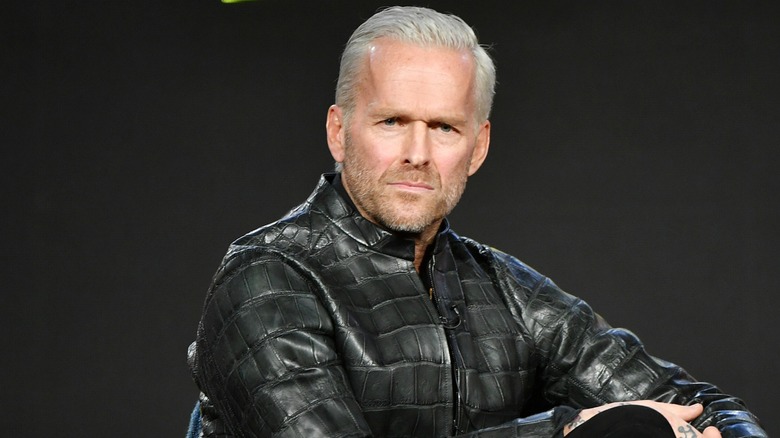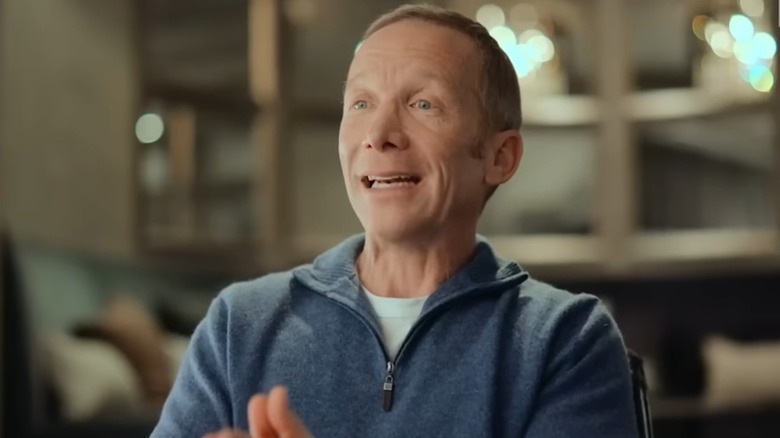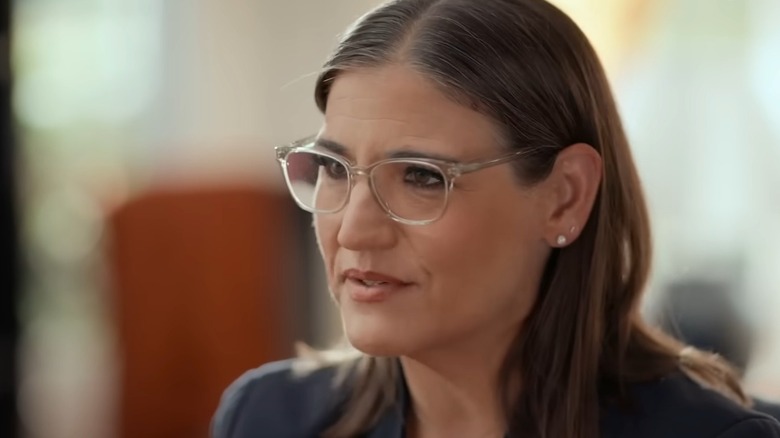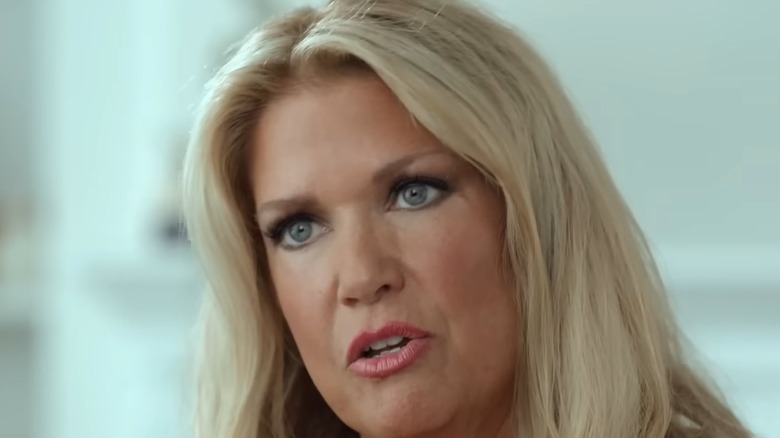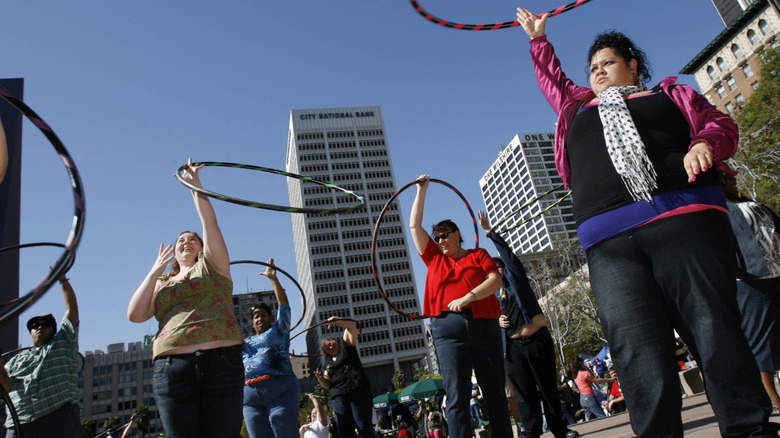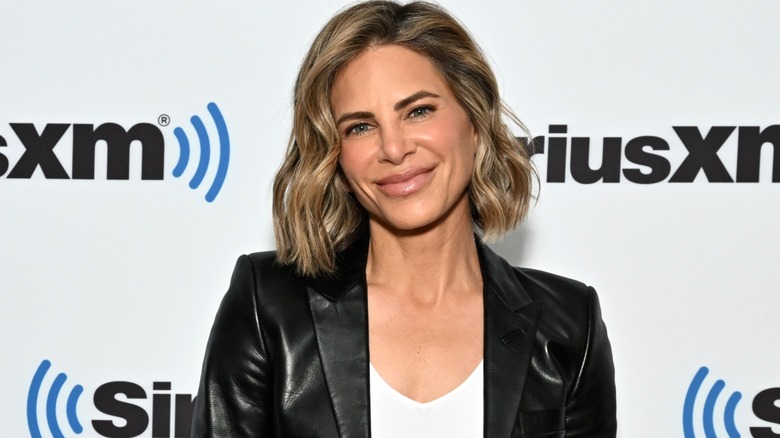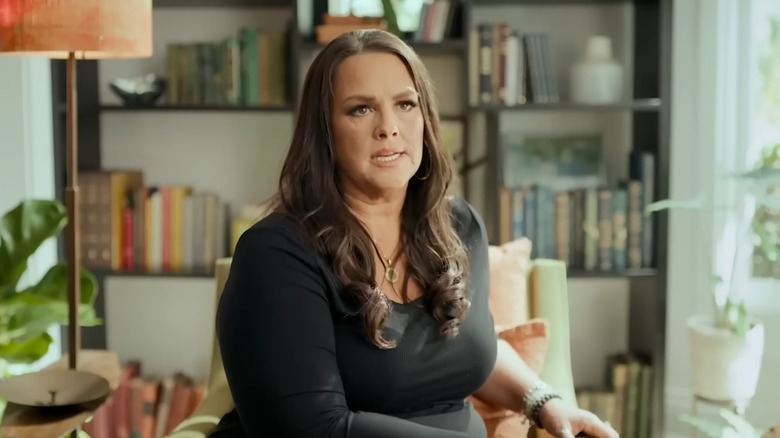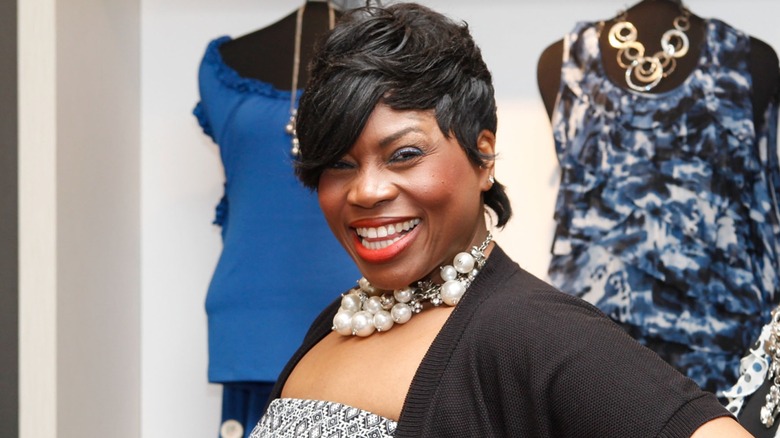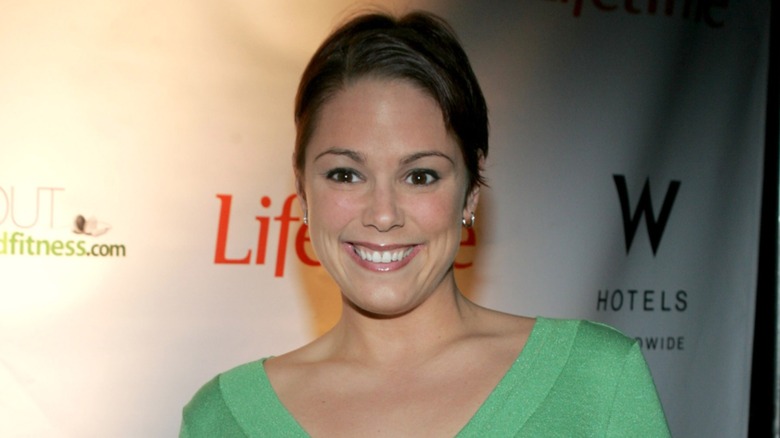The Dark Side Of The Biggest Loser Producers Don't Want You To Know
When it comes to fitness and healthy living, a few television series have enjoyed as much airtime as NBC's "The Biggest Loser" (a show more cringe than fans remember). The show premiered in 2004 and ran for 17 seasons. "The Biggest Loser" then returned for another season on USA Network in 2020 before it exited the small screen for good. Part of the show's allure was its premise, which was unlike any other: a group of people would compete to lose the most weight for a grand cash prize of $250,000.
Before the show went on air, its co-creator, J.D. Roth, was discouraged by professionals. "Every medical expert that I could find said you can't lose more than one or two pounds a week—from nutritionists to doctors to scientists, weight loss specialists, exercise physiologists, you name it," Roth recalled in an interview with TV Insider. The television producer added that there was a glimmer of hope when the first contestant lost 16 pounds in a week.
It wasn't all sunshine and rainbows on the set of "The Biggest Loser," despite the fact that the show drew the attention of millions of viewers with each passing season. Over the years, the dark side of "The Biggest Loser" slowly became public. From allegations of misconduct to emotional manipulation to extreme weight loss measures, here's what the show's producers do not want you to know.
The show's ideal contestants were people who were 'overweight and unhappy'
When J.D. Roth co-created "The Biggest Loser," he was a budding producer with no clue about what his next show would be. Even though he'd been cautioned against pursuing the show by experts, he saw a window he could tap into: emotional vulnerability. "What we perceive as hunger pain is really emotional pain," Roth explained in a conversation with plant dietitian Sharon Palmer. "Doctors and nutritionists are good at physical health, but not emotional health. I saw that people could achieve weight loss if we managed the emotional side of weight loss, not just the calories in and out."
Unfortunately, Roth and his team didn't exactly capitalize on the emotions of people who were content. In fact, his ideal participants on the show were dispirited, as he revealed on the Netflix documentary "Fit for TV: The Reality of the Biggest Loser." "We were looking for people who were overweight and unhappy," Roth disclosed. His approach was validated by S6 contestant Vicki Clark, who was severely critical of herself at the grand finale. When she was shown a picture of herself before weight loss, Clark told "The Biggest Loser" trainer Bob Harper (via YouTube), "When I look in those eyes, I see sadness ... and it's gone." As "The Biggest Loser" aired, critics observed that contestants were chosen by how well their emotions could be manipulated.
The show's casting directors were accused of using questionable recruiting methods
"The Biggest Loser" production team held auditions across the U.S. The squad was assured of a great turnout since most people wanted to lose weight on television and didn't mind waiting in line to make their dreams come true. "I want to cut myself in half and be the thin, gorgeous me that is screaming to get out right now," an aspiring contestant, Kariann Hibbard, told KSL-TV during Salt Lake City auditions in March 2010.
On Netflix's "Fit for TV: The Reality of the Biggest Loser," the show's casting directors were accused of using unscrupulous methods to manipulate aspirants who made the cut. Suzanne Mendonca, a contestant on S2 of "The Biggest Loser," claimed that her efforts to get healthy before the show started were stopped. "They would say, 'No, we don't want you to do that. We want you to gain more weight,'" Mendonca, who engineered a class-action suit against the show, shared (via People). "I wanted to be on the show so badly that I did gain extra weight."
Additionally, participants on "The Biggest Loser" alleged that they weren't given enough time to scrutinize their contracts, which included a clause on the probability of death. According to Tracey Yukich, a contestant on S8, her attempt to get an attorney to read the fine print was met with a threat that others were willing to take her place.
Some participants felt that the creators of The Biggest Loser were feeding into stereotypes
Although most participants on "The Biggest Loser" were there by choice, they did not entirely agree with the show's concept. On "Fit for TV: The Reality of the Biggest Loser," S3 contestant Jen Kerns argued that the show supported biased views. "They were really reinforcing the stereotypes," Kerns, who later worked as a doctor on the show's fifth and fourth seasons, said.
Kerns wasn't the only former contestant with such views. Kai Hibbard, who was advised to participate on "The Biggest Loser" by a friend, expressed remorse over joining the show's third season. Despite ending up in second place, she told The New York Post that "the whole f***ing show is a fat-shaming disaster that I'm embarrassed to have participated in." Hibbard later wrote a book, "Losing it: A Fictional Reimagining of My Time on Weight Loss Reality TV," in which a fictionalized version of herself questioned the show's approach to weight loss.
A 2013 research study conducted on "The Biggest Loser" by the University of Missouri's Department of Communication found that it played a role in the stigmatization of overweight individuals. Per the researcher's findings, most people who tuned in to watch the show had concerns about their weight, and the aftermath would be the attribution of weight loss to personal duty, ultimately leading to a fat-shaming attitude.
The show's rigorous training was deemed unsustainable in the long-term
Several participants on "The Biggest Loser" lost a substantial weight in a short amount of time. This was one of the reasons why people suspected that the show was fake. According to "Fit for TV: The Reality of the Biggest Loser," contestants were on a major calorie deficit. Suzanne Mendonca alleged they had a daily intake of 800 calories, while S7 contestant Joelle Gwynn revealed they were required to burn 6,000 calories.
The class-action lawsuit filed by Mendonca revealed the rigorous training. Contestants were reportedly forced to exercise without any water consumption and ignored when the cameras were off. Similarly, S1 winner Ryan Benson also claimed that his urine, during his final weigh-in, contained blood as a result of severe dehydration.
Many contestants, including Benson, gained their weight back after they exited "The Biggest Loser." Season 5 winner Ali Vincent opened up on her journey in a post shared to Facebook. "On April 16th, I did one of the hardest things in my life. I joined Weight Watchers and weighed in close to the weight I started at on The Biggest Loser," Vincent wrote. "I swore I would never be there again, be here again. I couldn't imagine a day again that I would weigh over 200 pounds. I feel ashamed. I feel embarrassed. I feel overwhelmed. I feel like [a] failure."
Aspiring contestants who never made it to the show didn't get access to their health records
When "The Biggest Loser" was on air, it wasn't abnormal for participants to undergo all kinds of tests. Sometimes the adults undertook biological assessments that determined what age they were on the inside, and other times, the show's kid ambassadors assessed their fitness progress. The bottom line is that a sense of transparency was maintained with the contestants, but the same could not be said for the auditioning process.
"The Biggest Loser" casting calls were a rigorous affair, and for Julie Ana Kim, a resident of Orange County, California, the exercise — no pun intended — took all of three months. Like everyone else, Kim's application was taken through different stages, including a video submission, an in-person interview and even a sit-down with network executives. Aspirants who wanted to join the show also underwent a couple of tests, including a psychological assessment and a thorough medical examination.
Surprisingly, their results were only known to the recruitment crew. "They did a whole scan of my body to see how much body fat I had; it took almost 15 minutes and was like a CT scan of the body," Kim disclosed in a conversation with Pop Sugar. "They hooked up wires all over me while I ran on the treadmill and did tests. They did a breathing test... It was interesting; the only thing is we never got to see our results."
The real reason Jillian Michaels left The Biggest Loser
Fitness coach Jillian Michaels' story is no different from contestants on "The Biggest Loser." She also struggled with her weight in the past and eventually found a home in martial arts. Michaels wound up as a coach on TV, where she earned a reputation for being tough. According to Michaels, it was just an act. "'The Biggest Loser' Jillian is more of a character that I play on TV, unfortunately, it's what a lot of people have come to know me as," Michaels told Dear Doctor.
Michaels' relationship with the show was hot and cold. She was an original coach and worked periodically for 10 years until her departure in 2014. Every time she left, Michaels was replaced by other coaches like Anna Kournikova, who was forced out of the show. Her long history with "The Biggest Loser" includes a two-year stint as a coach in the Australian version.
When Michaels finally left, it was due to how she was portrayed. "In the beginning of the show it was tough love. You saw the tough, and you saw the love," Michaels later told People, adding, as the show progressed, her character became more ruthless. A good chunk of the beautiful rapport she created with participants didn't make it on air, leading to "this warped negative perception of me." Michaels also confirmed what we suspected all along about "The Biggest Loser" set: it was "weight loss on a ticking clock," as she told Today.
Some of the injuries sustained on the show were life-threatening
The harsh training on "The Biggest Loser" wasn't favorable for some of the show's participants, including S8 contestant Tracey Yukich, who had a tough time running a mile on the beach. Yukich lost consciousness and eventually wound up in the hospital, and per her account on "Fit for TV: The Reality of the Biggest Loser," her body began shutting down. "I didn't realize that I had rhabdomyolysis. And rhabdomyolysis is your body's way of saying, 'I'm going to shut down on you,'" Yukich recalled (via E!). "It started with my liver, then it was in my kidneys and then it goes to your heart. And that's where I almost died."
Another contestant ended up in hospital following the one-mile race, and a S9 participant experienced serious cramps after exercising on a stationary bike. In her chat with The New York Post, Kai Hibbard revealed she had a torn calf muscle and bursitis in her knees, but when doctors recommended rest, the producers of "The Biggest Loser" disagreed.
When injuries didn't manifest on set, they began to show up after filming. In the case of S1 contestant Ryan Benson, the blood in his urine was pointed out as a sign of kidney malfunction. According to medical experts, health complications arose from the fact that participants were being given pro athlete levels of training after living sedentary lifestyles for most of their lives.
There have been contradicting accounts on Jillian Michaels' use of caffeine supplements on The Biggest Loser
On the Netflix documentary "Fit for TV: The Reality of The Biggest Loser," fitness coach Jillian Michaels was accused of giving caffeine supplements to contestants without the approval of the show's resident doctor, Robert Huizenga. It was also alleged that her fellow trainer, Bob Harper, had no knowledge that the pills were being used. Following the explosive claims, Michaels took to Instagram, writing in part, "Dr. Huizenga did approve caffeine pills on many seasons of Biggest Loser. Bob Harper not only knew about the caffeine pills, the 'stackers fat burner' were actually his suggestion."
Michaels further claimed that some of the producers helped with distributing the said supplements. In addition to her scathing response, the trainer revealed to TMZ that she was pursuing legal action against the duo. Michaels alleged that not only was caffeine not banned on the show, but contestants would also use other products, like Ambien and tobacco.
Her claims could hold water after all, since Dr. Huizenga himself was accused of administering questionable medication to contestants in the past. Season 7 contestant Joelle Gwynn once claimed that Dr. Huizenga prescribed Adderall in order to help participants with appetite control. In response, the medical practitioner took legal action against Gwynn, with claims that her allegations had "resulted in the cancellation of 'The Biggest Loser' and Dr. Huizenga losing two other opportunities on television," as Syracuse reported.
The show's producers were accused of having no regard for participants' right to privacy
The producers and crew on "The Biggest Loser" were accused of disregarding participants' right to privacy. As part of the exercise, contestants would check into a hotel, but were reportedly not allowed to move around freely. Whenever they left their rooms, the crew would be informed. "They assume you're going to talk to other contestants," former participant Kai Hibbard told The New York Post, adding her key card was seized as soon as she checked in.
When they were alone in their rooms, the show's participants were supposedly being monitored. An anonymous source who also spoke to the outlet claimed that their laptop and phone were confiscated upon arrival, and when the gadgets were returned, it appeared that they had been tampered with. "The camera light on my MacBook would sometimes come on when I hadn't checked in," the source told The New York Post. "It was like Big Brother was always watching you."
According to their contracts, the participants weren't allowed to share their stories in any form. Additionally, there were claims that the show's producers had cautioned them against speaking to the press, and any attempts to do so would result in a $1 million fine.
A handful of contestants went to extreme lengths to lose weight
As experts predicted, some contestants were unable to lose weight quickly. Kai Hibbard would fast on set and work out in full clothing at high temperatures. "I'd put on a sports bra, a tank top, a t-shirt, and a sweatshirt and then my spandex shorts, pants, sweatpants, a baseball cap, and just zip it all up," she shared in a conversation with ABC. "I'd go to the gym, which had no air conditioner, and work out for two hours or as long as I could stand it without drinking water."
Hibbard only fed on sugar-free Jell-O and asparagus for days on end. Hibbard claimed that it was normal to take such measures since most people were doing the same, and the result was a string of dramatic transformations. Season 17 contestant Sarah Gilbert admitted to eating less food than she needed to weigh less on the scale.
Over time, the acute transformations bothered some of the trainers. When S15 winner Rachel Frederickson controversially lost 60% of her body weight over a seven-month period, it was reported that fitness trainer Jillian Michaels wanted out of the show because "there isn't proper attention paid to the contestants' health or wellness," a source told People.

